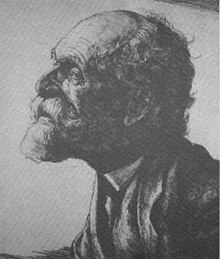|
Ernst Marcus (philosopher) Ernst Moses Marcus (3 September 3, 1856, Kamen – 30 October, 1928 Essen) was a German lawyer and philosopher. He developed a theory of aether based on Immanuel Kant's posthumous work Opus Postumum, however sharply disagreeing with Erich Adickes interpretation. He used this to mount a criticism of Albert Einstein's theory of relativity.[1] He was a major influence on Salomo Friedlaender. Ernst was the son of Robert Ruben Marcus and Berta Marcus.[2] Marcus studied law in Bonn and Berlin. Whilst working as an Assessor in 1889 he developed an interest in philosophy. In 1890 he was appointed as a judge in Essen. In 1893 he married Berta Auerbach with whom he had three children.[3] In 1899 he started regular meetings with Salomo Friedlaender who admired his theses and became a firm supporter of him. Friedlaender referred to him by epithet the "Krupp of logic". Works
His papers are held by the Leo Baeck Institute, New York.[3] References
|